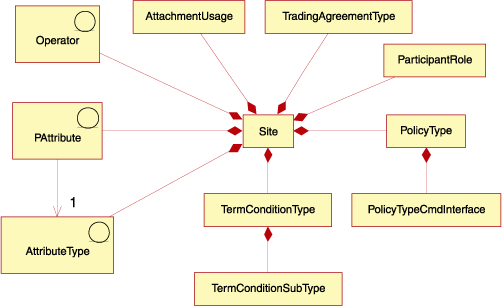
Trading agreement data
A package of Trading Agreements. WebSphere Commerce provides a number of
trading mechanisms that govern the interactions between buyers and sellers. A trading agreement
represents an instance of a trading mechanism and records the properties of that instance of a
trading mechanism. Each contract, business account, and RFQ in WebSphere Commerce is represented
by a trading agreement. WebSphere Commerce supports several trading agreement types, including
account, contract, RFQs, and exchange. Trading Agreements are specific to a particular Store, and
thus the Trading Agreements package is shown as dependent on the Store.Trading agreement
data is contained by the site.

- Site
- A site can contain the following trading agreement data:
- Trading agreement type
- Participant role
- Policy role
- Policy type
- Policy type command interface
- Terms and conditions type
- Terms and conditions sub type
- Personalization attribute
- Personalization attribute type
- Operator
- Attachment usage
- Trading agreement type
-
WebSphere Commerce provides a number of trading mechanisms that govern the interactions between buyers and sellers. A trading agreement represents an instance of a trading mechanism and records the properties of that instance of a trading mechanism. Each contract, business account, and RFQ in WebSphere Commerce is represented by a trading agreement. WebSphere Commerce supports several trading agreement types, including account, contract, RFQs, and exchange. The trading agreement types are defined in the TRDTYPE table.
- Participant role
- Participants in trading agreements take on specific roles within each trading agreement. WebSphere Commerce supports several participant roles, including creator, seller, buyer, supplier, approver, administrator, distributor, service provider, reseller, host, and recipient. Participant roles are defined in the PARTROLE table.
- Policy type
- WebSphere Commerce supports several types of business policies, including price, product set, shipping mode, shipping charge, payment, and several others. Policy types are defined in the POLICYTYPE table.
- Policy type command interface
- The policy type command interface is the Java command interface for the business policy object. The command for each policy instance must implement this interface. There can be zero or more commands for each business policy object.
- Terms and conditions type
- Terms and conditions define the behavior and properties of a trading agreement. WebSphere Commerce supports severalterms and conditions types, including pricing, payment, and shipping. Terms and conditions types are defined in the TCTYPE table.
- Terms and conditions sub type
- Each terms and conditions type can contain several terms and conditions sub types. Terms and conditions sub types are defined in the TCSUBTYPE table.
- Attribute type
- The attribute type defines the type of the attribute. Attribute types are defined in the ATTRTYPE table.
- Personalization attribute
- The personalization attribute provides you the ability to create attributes for products. The personalization attribute is defined in the PATTRIBUTE table. Each personalization attribute has an attribute type.
- Operator
- The operators used in the site include simple operators (which allow a single value), compound operators (which allow a continuous range), and compound operators (which allows a set). Operators are defined in the OPERATOR table.
- Attachment usage
- An attachment is a supporting document for a trading document. For example, it can be a specification of a product, or a price list spreadsheet. Attachment usage describe how and where attachments are used. Attachment usage is defined in the ATTACHUSG table.